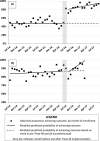Early outcomes after implementation of treat all in Rwanda: an interrupted time series study
- PMID: 30993854
- PMCID: PMC6468264
- DOI: 10.1002/jia2.25279
Early outcomes after implementation of treat all in Rwanda: an interrupted time series study
Abstract
Introduction: Nearly all countries in sub-Saharan Africa have adopted policies to provide antiretroviral therapy (ART) to all persons living with HIV (Treat All), though HIV care outcomes of these programmes are not well-described. We estimated changes in ART initiation and retention in care following Treat All implementation in Rwanda in July 2016.
Methods: We conducted an interrupted time series analysis of adults enrolling in HIV care at ten Rwandan health centres from July 2014 to September 2017. Using segmented linear regression, we assessed changes in levels and trends of 30-day ART initiation and six-month retention in care before and after Treat All implementation. We compared modelled outcomes with counterfactual estimates calculated by extrapolating baseline trends. Modified Poisson regression models identified predictors of outcomes among patients enrolling after Treat All implementation.
Results: Among 2885 patients, 1803 (62.5%) enrolled in care before and 1082 (37.5%) after Treat All implementation. Immediately after Treat All implementation, there was a 31.3 percentage point increase in the predicted probability of 30-day ART initiation (95% CI 15.5, 47.2), with a subsequent increase of 1.1 percentage points per month (95% CI 0.1, 2.1). At the end of the study period, 30-day ART initiation was 47.8 percentage points (95% CI 8.1, 87.8) above what would have been expected under the pre-Treat All trend. For six-month retention, neither the immediate change nor monthly trend after Treat All were statistically significant. While 30-day ART initiation and six-month retention were less likely among patients 15 to 24 versus >24 years, the predicted probability of both outcomes increased significantly for younger patients in each month after Treat All implementation.
Conclusions: Implementation of Treat All in Rwanda was associated with a substantial increase in timely ART initiation without negatively impacting care retention. These early findings support Treat All as a strategy to help achieve global HIV targets.
Keywords: HIV; Africa; Treat All; antiretroviral therapy; retention in care; universal test and treat.
© 2019 The Authors. Journal of the International AIDS Society published by John Wiley & Sons Ltd on behalf of the International AIDS Society.
Figures
Similar articles
-
Immediate and long-term outcomes after treat-all among people living with HIV in China: an interrupted time series analysis.Infect Dis Poverty. 2023 Aug 14;12(1):73. doi: 10.1186/s40249-023-01119-7. Infect Dis Poverty. 2023. PMID: 37580822 Free PMC article.
-
Changes in rapid HIV treatment initiation after national "treat all" policy adoption in 6 sub-Saharan African countries: Regression discontinuity analysis.PLoS Med. 2019 Jun 10;16(6):e1002822. doi: 10.1371/journal.pmed.1002822. eCollection 2019 Jun. PLoS Med. 2019. PMID: 31181056 Free PMC article.
-
Trends in and correlates of CD4+ cell count at antiretroviral therapy initiation after changes in national ART guidelines in Rwanda.AIDS. 2015 Jan 2;29(1):67-76. doi: 10.1097/QAD.0000000000000520. AIDS. 2015. PMID: 25562492 Free PMC article.
-
Interventions to improve early retention of patients in antiretroviral therapy programmes in sub-Saharan Africa: A systematic review.PLoS One. 2022 Feb 9;17(2):e0263663. doi: 10.1371/journal.pone.0263663. eCollection 2022. PLoS One. 2022. PMID: 35139118 Free PMC article.
-
Simplified clinical algorithm for immediate antiretroviral therapy initiation: The HATI [HIV awal (early) Test & Treat in Indonesia] implementation research in Indonesia.Indian J Med Res. 2022 Jun;156(6):729-741. doi: 10.4103/ijmr.ijmr_239_23. Indian J Med Res. 2022. PMID: 37056072 Free PMC article. Review.
Cited by
-
HIV treatment outcomes among people with initiation CD4 counts >500 cells/µL after implementation of Treat All in South African public clinics: a retrospective cohort study.J Int AIDS Soc. 2020 Apr;23(4):e25479. doi: 10.1002/jia2.25479. J Int AIDS Soc. 2020. PMID: 32319203 Free PMC article.
-
The Impact of Same-Day Antiretroviral Therapy Initiation Under the World Health Organization Treat-All Policy.Am J Epidemiol. 2021 Aug 1;190(8):1519-1532. doi: 10.1093/aje/kwab032. Am J Epidemiol. 2021. PMID: 33576383 Free PMC article.
-
Association Between Time to Antiretroviral Therapy and Loss to Care Among Newly Diagnosed Rwandan People Living with Human Immunodeficiency Virus.AIDS Res Hum Retroviruses. 2023 May;39(5):253-261. doi: 10.1089/AID.2022.0023. Epub 2023 Mar 17. AIDS Res Hum Retroviruses. 2023. PMID: 36800896 Free PMC article.
-
Twelve-Year Trend in the Prevalence of High-Risk Human Papillomavirus Infection Among Rwandan Women Living With HIV.J Infect Dis. 2020 Jun 16;222(1):74-81. doi: 10.1093/infdis/jiaa065. J Infect Dis. 2020. PMID: 32050023 Free PMC article.
-
Impact of Comprehensive Strategy on Mortality in Heterosexually Transmitted HIV-Infected Individuals - Liangshan Prefecture, Sichuan Province, China, 2008-2024.China CDC Wkly. 2025 Jun 13;7(24):843-850. doi: 10.46234/ccdcw2025.138. China CDC Wkly. 2025. PMID: 40620294 Free PMC article.
References
-
- TEMPRANO ANRS 12136 Study Group , Danel C, Moh R, Gabillard D, Badje A, Le Carrou J, Ouassa T, et al. A trial of early antiretrovirals and isoniazid preventive therapy in Africa. N Engl J Med. 2015;373(9):808–22. - PubMed
-
- World Health Organization . Consolidated guidelines on the use of antiretroviral drugs for treating and preventing HIV infection 2016: recommendations for a public health approach. 2nd edition. Geneva, Switzerland: World Health Organization; 2016.
Publication types
MeSH terms
Substances
Grants and funding
LinkOut - more resources
Full Text Sources
Medical


